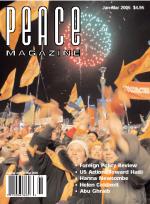
Peace Magazine Jan-Mar 2005, page 27. Some rights reserved.
Search for other articles by Bill Bhaneja here
Glenn Paige, Philadelphia: Xlibris Corp, 2002
In the fourth year of the new millennium, war and terrorism are the norm for resolving international conflicts. Has nothing been learned from the bloody wars of the previous century? That's the question asked by Glenn Paige, professor emeritus of political science at the University of Hawaii, in Nonkilling Global Political Science.
Paige argues that if political scientists do not seriously challenge the acceptance of lethality, then one could hardly expect citizens to do so. He also asks: "Is a nonkilling global society feasible?" then challenges his discipline, asking whether a nonkilling global political science is achievable. On both counts, his answer is a resounding "yes."
This work synthesizes decades of research by Paige, the author of The Korean Decision (1968), The Scientific Study of Political Leadership (1977), and To Nonviolent Political Science: From Seasons of Violence (1993).
The term "nonkilling" is not as comforting as "nonviolence." Mighty nations still assert pre-emptive wars without qualms. Paige shows that both the violence-accepting politics and political science of the last century have failed to suppress violence by violent means. The study of government and international politics has not addressed the root cause of global violence.
Paige's vision is for political science to diagnose the pathology of lethality, and seek to remove killing from global life. He shows that at most only about five percent of human beings have ever killed another person. Paige suggests we should train people to strengthen their resistance to killing.
He uses medical science as a metaphor. Medicine, through focusing on prevention, intervention, and post-traumatic transformation strategies, has produced both knowledge and practitioners for the preservation of life. Paige considers the same commitment to non-lethality applicable to the social sciences.
The last three chapters of the book lay out a model of a nonkilling global society. Why has the study of successful conflict resolution remained neglected? There is a long list of Nobel Peace Prize recipients who dared to take the nonviolent route for complex regime change in their respective countries, and succeeded. Their accomplishments, leadership styles, ideologies, skills, and strategies are waiting to be analyzed.
Plutarch (c. 40-120 AD) suggested some principles for the comparative study of rulers. These can be used to evaluate peaceful leadership in terms familiar to modern social science -- personality, role, organization, tasks, values, setting, and errors. This has been done for Gandhi.
Paige calls into question the Weberian dogma that acceptance of violence is required for the practice and science of politics. On this bias, he writes that
"political science has tended to be unreceptive to theoretical imagination, and this is especially true with regards to nonviolence creativity. By dismissing it in professional training as "utopian," "idealistic," and "unrealistic," political science is condemned to support perpetual lethality."
Killing that was expected to liberate, protect, and enrich has become instead a threat to human and planetary survival. Intended defences can become the source of self-destruction. Bodyguards kill their own heads of state, armies violate and impoverish their own people, and nuclear weapons proliferate to threaten their possessors.
Paige concludes that the time has come for a paradigm-shift in the discipline:
"If tradition has taught that we must kill to be free, equal and secure, the present teaches that unless we stop killing, not only freedom and equality are in jeopardy but our very survival -- individual, social, and ecological -- is imperiled."
Paige considers his "Nonkilling" approach to be reachable as a new sub-field of political science. The book is both provocative and creative, a wonderful tonic for these troubled times.
Rachel M. MacNair, Perpetration-Induced Traumatic Stress: the Psychological Consequences of Killing, Westport: Praeger Publications (2002).
Chalmers Johnson, Sorrows of Empire: Militarism, Secrecy, and the End of the Republic, New York: Henry Holt and Company (2004).
James Waller, Becoming Evil: How Ordinary People Commit Genocide and Mass Killing, New York: Oxford University Press (2002).

Peace Magazine Jan-Mar 2005, page 27. Some rights reserved.
Search for other articles by Bill Bhaneja here